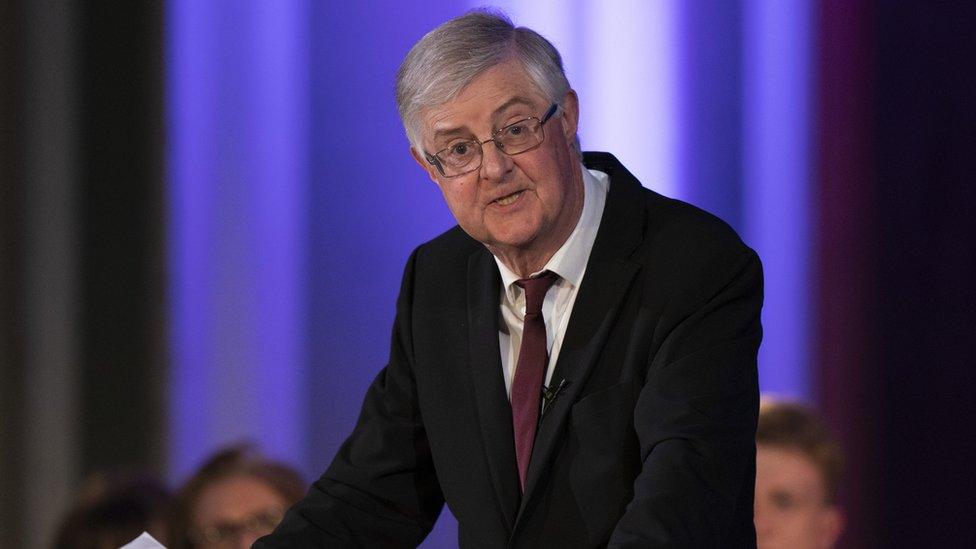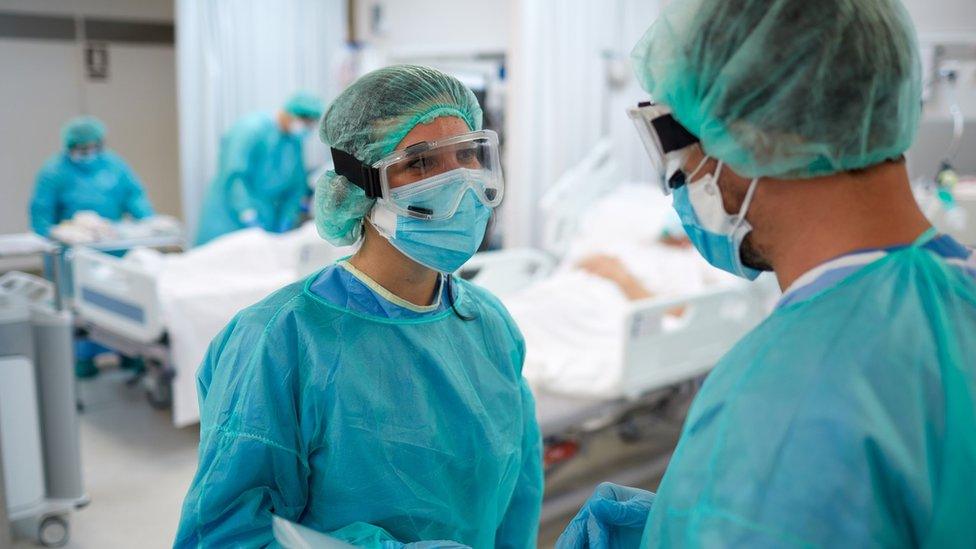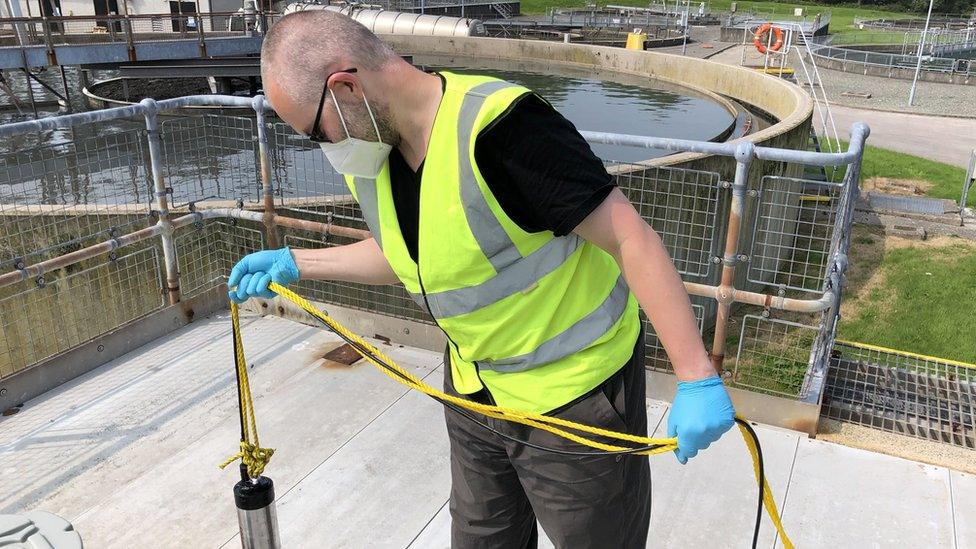Welsh public services must make cuts, Mark Drakeford says
- Published

"This is the toughest financial situation we have faced since devolution," says Mark Drakeford
First Minister Mark Drakeford has asked his ministers to find cuts in public services as inflation and public sector pay put the squeeze on Welsh government budgets.
No department - including the NHS and education - has been ruled out.
Members of the Welsh cabinet will meet throughout the summer to work out what can go from this year's budget.
Mr Drakeford says the Welsh government faces its "toughest financial situation" since it began in 1999.
He blamed the UK government for not providing extra cash off the back of promises to raise pay, and denied his government was panicking.
The Labour-run administration said it was £900m short in its £20bn budget than when it was set in 2021.
But an expert at the respected IFS think-tank said the hit to the budget from inflation was probably not as high as Welsh ministers said.
The UK government claimed the Welsh government "is currently receiving the largest funding settlement in the history of devolution" and said its budget was increasing in "real terms".
Welsh Conservatives said Labour was making its "own problems worse" by pushing "vanity projects" like the switch to 20mph and plans for more Senedd politicians.
Meanwhile Plaid Cymru, which is in a co-operation deal with the Welsh government, said Labour should take "some responsibility" for its own budget setting process.
The NHS, education and council-run services like social care are among the public services the Welsh government funds.
It is not clear at this stage where the cuts might fall, with the cabinet looking at both this financial year and the next.
Most of the Welsh government's money comes from the UK government, although it raises some from tax.
Recent pay rises announced for teachers, and doctors in England did not trigger extra funds for Mark Drakeford's administration, meaning the money for pay deals in Wales also have to be found from elsewhere in Welsh government's funds.

The NHS has not been ruled out of Welsh government cuts
'No panic'
It is unusual for announcements of cuts to be made mid-way through a financial year.
Speaking to BBC Wales, Mr Drakeford denied that his announcement, made in a written statement to the Senedd on Wednesday, showed his government was panicking.
"It is anything but panicking," he said.
"I'm very keen that people know, that Members of the Senedd, know the work that is going on over this summer."
He said he was unable to provide detail, and that "every part of the Welsh government has to play its part" - including the health service.
"The idea that you could insulate the health service entirely from the realities of a £900m gap between what we need and what we've got, cannot be our starting point," he said, although he added it remained a priority for funding.
Mr Drakeford said he could not raise income tax in the current financial year but did not rule it out for the next.
"Nobody should think that raising more money in taxes in Wales on people who are already stretched to their limit is an easy way out of this dilemma," he added.
What do experts think?
David Phillips, head of devolved finance at think tank IFS, said the impact of inflation on the Welsh government budget was "probably not as much as £900m", but was still higher than expected.
The Welsh government has used the CPI consumer prices rate of inflation - but Mr Phillips said that "probably overstates the impact of inflation on the government".
Guto Ifan, an expert on public finances at Cardiff University, said it is difficult to measure precisely the scale of the hit of inflation on the Welsh budget, although he said it was "significant".
"Even after additional funding from the UK government at the Autumn Statement and Spring Budget, the real spending power of the Welsh budget has significantly reduced compared to when its medium-term spending plans were originally set in December 2021," he said.
He added it was "unclear what has triggered the need to mitigate in-year budgetary pressures, when inflationary pressures would have been known when budget plans for 2023-24 were finalised.
"Overspending in some area of the budget could be forcing a rethink of spending plans."
Cuts to free school meals and Covid monitoring
In recent weeks the Welsh government has faced criticism for cutting free school meals help over the holidays - a policy thought to cost about £15m.
The Welsh government also suddenly scrapped £4.4m for monitoring sewage for Covid, despite a minister having officially opened a research centre in Bangor just months before.
Both were blamed on financial problems. A Welsh government source said the decision not to extend free school meals over the holidays showed how serious the situation was.
'You couldn't make it up'
Conservatives say they will try to force a vote on the issue in the Senedd when it sits again in the autumn.
Tory Senedd leader Andrew RT Davies said: "Only back in March the Labour government, and their co-operation agreement partners in Plaid Cymru, sent back £150m to the UK treasury that they failed to spend.
"Now they're saying they don't have enough money, you couldn't make it up."
Plaid Cymru finance spokesperson Peredur Owen Griffiths asked if the government would bring forward a supplementary budget to the Senedd in the autumn "rather than wait until February next year so we can see the detail of what was being discussed".
His party has an agreement with the Welsh government to implement a number of policies, including universal free school meals. It has faced calls from some in Labour to be scrapped.
Asked whether Plaid would be willing to renegotiate any of the deal, a spokesman said: "Whilst Plaid Cymru will always want to facilitate the delivery of the agreement in the most efficient and effective way possible the elements contained within it amount to around 1% or less of the Welsh government revenue budget.
"It is for the Labour Welsh government to prioritise its budget from the remaining 99% under its control."
In a written statement to Members of the Senedd, Mr Drakeford said: "This is the toughest financial situation we have faced since devolution.
"We are in this position because of the record levels of inflation we have experienced post-pandemic; because of the mis-management of the economy and public finances by successive UK governments over the last 13 years and because of unfunded commitments made by the UK government, particularly in relation to public sector pay.
"The cabinet will be working over the summer to mitigate these budgetary pressures based on our principles, which include protecting frontline public services, as far as possible, and targeting support towards those at greatest need. A further update will be provided to the Senedd once this work has been completed."
A UK government spokesman said: "The Welsh government is currently receiving the largest funding settlement in the history of devolution.
"We are providing a record £18bn per year settlement, which is still increasing in real terms over the 2021 Spending Review period.
"The best way we can help families and support growth across Wales is to have low inflation which is why we're sticking to our plan to halve it this year - something which the Bank of England forecast only last week that we are on track to do."
Related topics
- Published3 August 2023

- Published13 July 2023